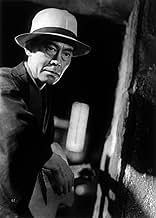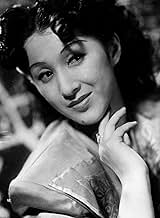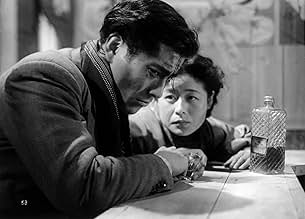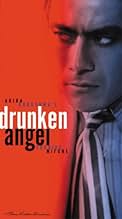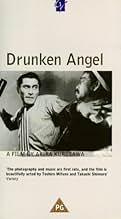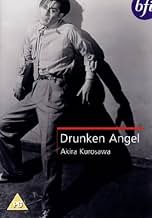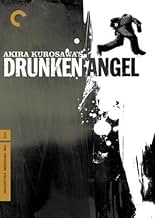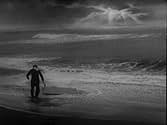IMDb-BEWERTUNG
7,6/10
14.176
IHRE BEWERTUNG
Füge eine Handlung in deiner Sprache hinzuA drunken doctor with a hot temper and a violence-prone gangster with tuberculosis form a quicksilver bond.A drunken doctor with a hot temper and a violence-prone gangster with tuberculosis form a quicksilver bond.A drunken doctor with a hot temper and a violence-prone gangster with tuberculosis form a quicksilver bond.
- Regie
- Drehbuch
- Hauptbesetzung
- Auszeichnungen
- 4 wins total
Mayuri Mokushô
- Daughter at Flower Shop
- (as Kumiko Mokushô)
Empfohlene Bewertungen
10Alan-57
Drunken Angel is another classic from arguably the greatest filmmaker of all-time. The story revolves around a petty gangster (Toshiro Mifune), who contracts TB and the Doctor (Takashi Shimura) who attempts to treat him despite the gangster's foolish pride. Mifune and Shimura, Kurosawa regulars, are brilliant in their respective roles. Kurosawa takes on film noir as well as any auteurs of his time. This is a must see for Kurosawa fans.
This movie was a big surprise for me. I watched this movie yesterday expecting it to be one of Akira Kurosawa's weaker films, but it ended up being my second-favourite Kurosawa film after Seven Samurai. All the other Kurosawa films I've seen were set in feudal Japan, so it was quite refreshing to see one set in post-war Japan for a change. While Kurosawa's other movies had a major impact on the samurai genre, Drunken Angel was arguably the earliest example of a Yakuza film.
Unlike the other Kurosawa movies I've seen, I found Drunken Angel gripping from the moment it began. Despite the film being shorter than the other Kurosawa films I've seen as well, the character development was very impressive and the ending was powerful. Being Toshiro Mifune's first major role, he obviously looks younger and hasn't yet developed his unique acting mannerisms. That's a good thing though, as it makes him seem like a completely different person in this movie. His portrayal of the Yakuza thug Matsunaga was impressive and very moving. The star of the movie though is Takashi Shimura (another veteran actor of Kurosawa movies), who plays the forward-thinking Dr. Sanada. His sarcastic dialogues in particular were excellent, without feeling clichéd at all.
I think it's a real shame this movie isn't so famous like Kurosawa's other movies, but I found this film incredibly moving and it is now my second-favourite Kurosawa film of all time after Seven Samurai.
9/10
Unlike the other Kurosawa movies I've seen, I found Drunken Angel gripping from the moment it began. Despite the film being shorter than the other Kurosawa films I've seen as well, the character development was very impressive and the ending was powerful. Being Toshiro Mifune's first major role, he obviously looks younger and hasn't yet developed his unique acting mannerisms. That's a good thing though, as it makes him seem like a completely different person in this movie. His portrayal of the Yakuza thug Matsunaga was impressive and very moving. The star of the movie though is Takashi Shimura (another veteran actor of Kurosawa movies), who plays the forward-thinking Dr. Sanada. His sarcastic dialogues in particular were excellent, without feeling clichéd at all.
I think it's a real shame this movie isn't so famous like Kurosawa's other movies, but I found this film incredibly moving and it is now my second-favourite Kurosawa film of all time after Seven Samurai.
9/10
Drunken Angel (1948)
*** (out of 4)
Straight-forward and simple drama about the troubled relationship between a low level gangster (Toshiro Mifune) dying of tuberculosis and the drunken doctor (Takashi Shimura) trying to save him during post-war Japan. There are a lot of different genres on display in this early Kurosawa film including noir, gangster and an odd couple drama. The three don't always mix too well together but Kurosawa's great direction mixed with the great lead performances make this a must see even if the gang would go onto much better films. What works the best here are the performances by Shimura and Mifune. The two men work extremely well together because they make their characters so well rounded to the point where you feel as if you know everything about the men. Mifune really digs deep into the gangster and this leads to many well acted scenes including the drunken one where the gangster must finally realize how serious his disease is. Shimura clearly steals the film as the angry and often times bitter, if still caring, drunken doctor. The amount of anger he displays with his character while still making us understand why he cares so much is perfectly done by the actor. Cheiko Nakakita and Reizaburo Yamamoto are also very good in their supporting roles of the nurse and gang boss. The cinematography is also top-notch especially a dream like sequence where the dying gangster invisions himself as a zombie-like creature. This scene is very effective as is another where spitting blood is involved. I think at times the film is way too over dramatic and this includes many scenes dealing with the "swampness" of Japan. Even with that said, this is still a very impressive drama that fans of Kurosawa will want to check out.
*** (out of 4)
Straight-forward and simple drama about the troubled relationship between a low level gangster (Toshiro Mifune) dying of tuberculosis and the drunken doctor (Takashi Shimura) trying to save him during post-war Japan. There are a lot of different genres on display in this early Kurosawa film including noir, gangster and an odd couple drama. The three don't always mix too well together but Kurosawa's great direction mixed with the great lead performances make this a must see even if the gang would go onto much better films. What works the best here are the performances by Shimura and Mifune. The two men work extremely well together because they make their characters so well rounded to the point where you feel as if you know everything about the men. Mifune really digs deep into the gangster and this leads to many well acted scenes including the drunken one where the gangster must finally realize how serious his disease is. Shimura clearly steals the film as the angry and often times bitter, if still caring, drunken doctor. The amount of anger he displays with his character while still making us understand why he cares so much is perfectly done by the actor. Cheiko Nakakita and Reizaburo Yamamoto are also very good in their supporting roles of the nurse and gang boss. The cinematography is also top-notch especially a dream like sequence where the dying gangster invisions himself as a zombie-like creature. This scene is very effective as is another where spitting blood is involved. I think at times the film is way too over dramatic and this includes many scenes dealing with the "swampness" of Japan. Even with that said, this is still a very impressive drama that fans of Kurosawa will want to check out.
This is a strange film about a very committed but screwed up doctor in post-war Japan. The doctor lives in the slums of Tokyo and is amazed at the filth and widespread incidence of preventable diseases among the poor. While this is an important cause to him, so is getting drunk and screwing up his life. However, the doctor meets a young hoodlum, played by Toshiro Mifune, and he treats him even when the guy insists everything is just fine! And, at times afterwards, Mifune alternates from being thankful and decent to being belligerent and completely antisocial. Throughout the film, the doctor works hard to keep this unlikable character alive--despite it seeming pretty obvious that Mifune has a death wish. A fascinating and odd story about the relationship between two very oddly matched men.
A very, very vivid film from Japanese legend, Akira Kurosawa. The Japanese town that is the setting for "Drunken Angel" is vividly captured by Kurosawa, and the filthy swamp that separates the doctor from the filthiness of the town is brilliant. Toshiro Mifune plays a tuberculosis stricken gangster who is slowly won over, despite his vicious pride, by the caring but sarcastic doctor. The swamp is a reflection of the corruption in the town and in one of the first scenes a group of children are seen playing in it. Kurosawa's way of foreshadowing these children's future since the town is controlled by the immoral gangsters. With the arrival of Okadu, a released convict and gangster, and struggles with his health, Mifune struggles through conflicts of soul which are brilliantly metaphored by Kurosawa. A great drama with some brilliant commentary about post-WW2 Japan. Solid characters carry with film about typical with the Doctor being an unforgettable creation and Toshiro Mifune giving a powerful performance.
Wusstest du schon
- WissenswertesIn early drafts of the script, the story was almost entirely about Doctor Sanada (Takashi Shimura) and Matsunaga the thug (Toshirô Mifune) was a small supporting part. However, Akira Kurosawa was so impressed with Mifune's performance that he greatly increased the Matsunaga part, to the point where the Doctor and Matsunaga are almost equal in screen-time.
- PatzerEven though the story takes place during the hot summer, breath can be seen coming from characters in several scenes.
- Zitate
Dr. Sanada: The Japanese love to sacrifice themselves for stupid things.
- VerbindungenFeatured in Kurosawa and the Censors (2007)
Top-Auswahl
Melde dich zum Bewerten an und greife auf die Watchlist für personalisierte Empfehlungen zu.
- How long is Drunken Angel?Powered by Alexa
Details
Box Office
- Bruttoertrag in den USA und Kanada
- 46.808 $
- Eröffnungswochenende in den USA und in Kanada
- 15.942 $
- 28. Juli 2002
- Weltweiter Bruttoertrag
- 47.023 $
- Laufzeit1 Stunde 38 Minuten
- Farbe
- Seitenverhältnis
- 1.37 : 1
Zu dieser Seite beitragen
Bearbeitung vorschlagen oder fehlenden Inhalt hinzufügen

Oberste Lücke
By what name was Engel der Verlorenen (1948) officially released in India in English?
Antwort
